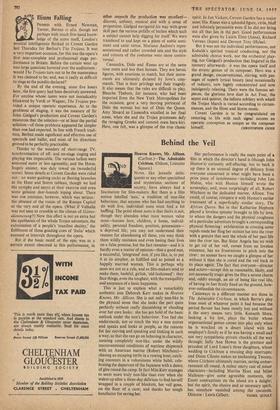Behind the Veil
Heaven Knows, Mr. Allison. (Carlton.)—The Admirable Crichton. (Odeon, Leicester Square.)
NUNS, like juvenile delin- quents or any other specialised and mysterious sections of society, have always had a fascination for film-makers. But there is a film notion labelled 'nun,' a tradition of nun-like behaviour, that anyone who has had anything to do with live, individual nuns must find a bit baffling. The point about nuns is that theirs is not, though they abandon what most women value most—human love, children, a home, individ- uality, personal freedom, position, possessions— a deprived life; you may not understand their reasons for abandoning all these, you may think them wildly mistaken and even basing their lives on a false premise, but the fact remains—and it is hardly even a matter of opinion—that a good nun, a successful, 'integrated' nun, if you like, is, to put it at its simplest, as fulfilled and as poised as a happily married woman. This is perhaps why nuns are not as a rule, and as film-makers tend to make them, bashful, girlish, 'old-fashioned' : they face things, even the toughest, with the tranquillity and assurance of a basic happiness.
This is just to explain what a remarkably authentic nun Deborah Kerr makes in Heaven Knows, Mr. Allison. She is not only nun-like in the physical sense that she looks the part quite perfectly without really diminishing or clouding over her own looks: she has got hold of the basic outlook under the nun's behaviour. You feel she understands, not so much the way a nun moves and speaks and looks at people, as the reasons for her moving and speaking and looking in such a way, so that she can go on behaving in character, seeming completely nun-like, under the wildly unconventional conditions of wartime shipwreck with an American marine (Robert Mitchum)— chasing an escaping turtle in a rowing boat, catch- ing coconuts in a voluminous white habit, cele- brating the departure of the Japanese with a dance of glee round the camp. In fact Miss Kerr manages to seem more truly nun-like than ever when she wakes up after a three-day delirium to find herself wrapped in a couple of blankets, her veil gone, on the floor of ,a cave; and thanks her tough benefactor for saving her. Her performance is really the main point of a film in which the director's hand is (though John Huston's) curiously self-effacing; but to back it up there is an unusual degree of delicacy from everyone concerned in what might have been a prize piece of tastelessness—including John Lee Mahin, who with Huston himself wrote the screenplay, and, most surprisingly of all, Robert Mitchum as the dedicated marine, Allison. You could, of course, compare it with Huston's earlier treatment of a superficially similar story, 7'he African Queen. But in that Katharine Hepburn played a loveless spinster brought to life by love, to whom the dangers and the physical roughness of a particular adventure brought a corresponding physical flowering : exhilaration at crossing some rapids made her fling her outsize hat into the river with a gesture that sent the whole of her past life into the river too. But Sister Angela has no wish to get rid of her veil, comes from no loveless existence, has no frustrations to pitch into the river : no sooner have we caught a glimpse of her without it than she is cured and the veil back in its place again. The fact that everyone—director and actors—accept this as reasonable, likely, and not necessarily tragic gives the film a serene charm and, oddly enough, an air of being like real life, of having its feet firmly fixed on the ground, how- ever outlandish the circumstances.
Castaways in a different manner are those in
The Admirable Crichton, in which Barrie's play
loses most of whatever point it had because the period flavour has been mostly lost and without it the story means very little. Kenneth More, looking a bit lost, plays the butler whose organisational genius comes into play only when he is wrecked on a desert island with his employer's family as if he was having a small and not very sympathetic private chuckle all the way
through; Sally Ann Howes is the prettiest and proudest of Lord Loam's three daughters, whose wedding to Crichton a rescuing ship interrupts; and Diane Cilento makes an enchanting Tweeny, whom Crichton ultimately marries, saving embar- rassment all round. A rather starry cast of minor characters—including Martita Hunt and Miles Malleson—give some agreeable moments, the Emett contraptions on the island are a delight; but the spirit, the elusive and so necessary spirit, has somehow vanished among the coconuts.


































 Previous page
Previous page